|
Chapter XIV
In 1934 my family and I moved from Connecticut to West
Point Pleasant, New Jersey. The trip was made in the old blue Buick,
loaded down with our belongings stuffed into a large trunk and into
every available corner of the car including the running board racks,
which were filled to the brim. I was most excited because we were going
to live in a house near Oona!
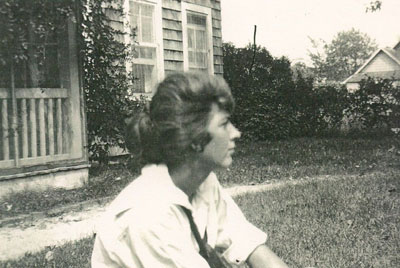 |
| Budgie,
1927 |
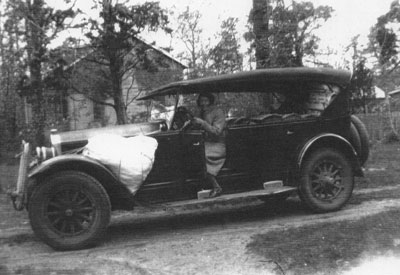 |
| The old
Buick with Budgie, 1927 |
On the way down to Jersey we traveled over the Bear
Mountain Bridge, which spans the Hudson River. Just as we crawled over
the top of a very high part of the hill the car stopped and wouldn’t
move. Oh no...out of gas! Budgie trudged down the mountain with a can
for gasoline and we watched as she disappeared out of sight.
Nanna, sitting in the back with Robert and me, began to
sense our restless anxiety. “Do you know why this is called Bear
Mountain?” Nanna asked us. By the time she finished her wild tale about
the bears in the hills, we were thoroughly frightened, and silently
crawled under a large car blanket so the bears wouldn’t see us. This was
her clever way of keeping us quiet! Then I began to worry that Mother
wasn’t back because a bear had found her, but finally she returned
intact, with a kind man from the gas station who helped her fill the gas
tank, and off we went.
In West Point Pleasant we settled into a small
brown-shingled house on Faltot Street, a block or two from Aggie, Oona
and Shane, and here we lived for about a year. Then Aggie wanted Nanna
to be close by to help with Oona when she had to be away, so she bought
a house for us, next door to The Old House on the Herbertsville Road and
we moved again.
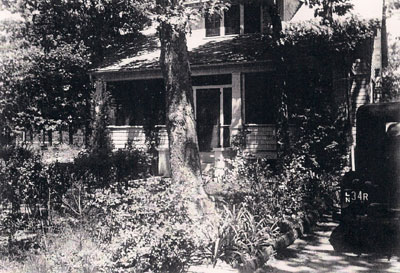 |
|
The ochre house next door to
The Old House, 1936. |
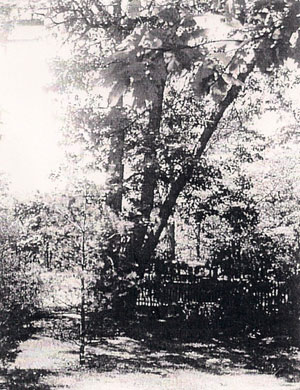 |
The Castle
Tree in Oona's yard, 1936. |
We loved the ochre-colored house. There were big
bedrooms for each of us, and a wonderful large living room and dining
room separated by a hall. In the hall was a huge grate for the furnace
heat to rise, and it blew wind up at us when we walked across. If we
played marbles on the nearby rug, the marbles would often roll down into
the little grate holes, to be gone forever!
The Old House next door was warm and comfortable and a
favorite place for me to go and visit because it always felt like
family. There was a large fireplace and on special occasions Aggie would
bring out a great bear rug so Oona and I could sit on the floor in front
of the fire. I well remember grand Thanksgiving dinners in the somewhat
formal dining room, served by the cook-housekeeper, Anna Gerber. Anna
and her brother, Dan, who helped with the outdoor chores, lived a short
way up the road.
A round, plump lady with a ruddy complexion, Anna was
always ready to tell you that things were worse with her than with you,
if ever she heard you complain. If one of us told Anna we had a stomach
ache, she came back with “ Me too, Missus!” and then the story of her
stomach ache. Oona and I loved old Anna and spent lots of time in the
kitchen chatting with her, eating her cookies and playing with the many
cats who lived much of the time in the connected back shed.
Growing up together, Oona and I had a strong bond with
each other. Besides being cousins, we were fatherless children. My
father, Ken Thomas, came to visit at times but there was for many years
a mystery connected to him. As related earlier, I did not know he was my
father. Oona's father existed in her life, but lived far, far away. She
seldom saw him, and he did not seem very interested in her.
Sometimes Oona was also a motherless child during those
seasons when her mother needed to be away for months at a time. Her
brother was away in boarding school and Oona would stay next door with
Nanna in The Old House, or with our cousins in Connecticut. I loved the
times she was next door to us, but I'm sure now she must have mourned
deeply for her own scattered family.
As my mother’s oldest sister and my aunt, Aggie was a
very strong influence in my life. I knew she had married Eugene O’Neill
and was with him for ten years before their divorce in 1928. To me she
was “Aggie,” but I always remember her as “Mrs. O’Neill” to others, and
it gave her an air of importance, which I had sensed at an early age. I
was old enough, when we moved next door, to become very impressed with
the great O’Neill. Though totally absent, he was still the once-husband
of my adored Aggie, and father to Shane and Oona.
I remember Aggie as tall with wavy dark hair and large
blue eyes, also a mole on her chin, which somehow didn't seem
unattractive. Her mouth was full and soft with a warm, relaxed smile
that might change in a flash to a hard, angry look. Even though I was a
little frightened of her at times, I wanted so much to be just like her
when I grew up. She seemed to be admired by everyone, and to have
everything she wanted or needed. That was what I believed.
Aggie also seemed wealthy, driving a car with leather
seats and living in The Old House which was long and rambling, and where
Anna did all the cooking and housekeeping so Aggie could write. Aggie
always found change in her pockets and was able to travel to exciting
places like Bermuda, and do interesting and romantic things. All of
this, I believed, was because she had been married to Eugene O’Neill and
she was still connected to him in some way, and famous because of it
even though Jimmy lived with her.
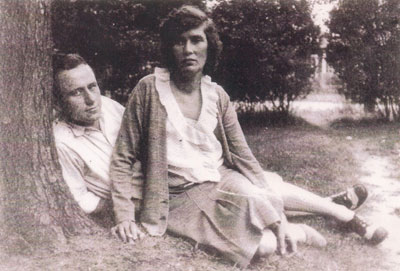 |
| Agnes with
Jimmy Delaney, 1937. |
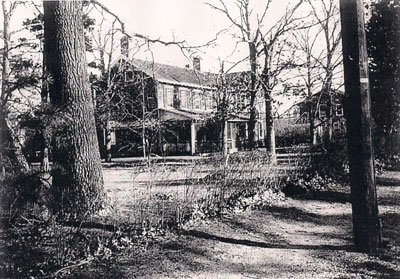 |
| The Old
House on Herbertsville Road. |
Jimmy Delaney, a newspaperman from Troy, New York, was
on the scene before Aggie went to Reno and for the years I well
remember. He lived with Aggie but she wouldn’t marry him. We understood
later that she would lose her support from Gene if she married again. I
remember Jimmy being a short, heavy-set man who loved to play golf. In
the summers he wore white pants and shirts, and in the winter he donned
a brown tweed jacket and wore knickers with argyle socks, all of which
fascinated me. He was quite friendly, but didn’t pay a lot of attention
to us as children, unless it was to drive us to the beach when Aggie was
busy.
When Jimmy took care of Oona at the time Aggie was
getting her divorce from O'Neill, he used to call her “Oona Ella
Oleander Banana-oil O’Neill,” which she loved as a little child. By the
time she was eight she considered it teasing and the name faded. It had
been an affectionate, playful joke because she was born in Bermuda where
the oleanders grow.
Those were the days when I was becoming more and more
aware of the O’Neill connection. Not only with living next door to
Agnes, Shane and Oona, but also from the many conversations I listened
in on between Mother and Nanna. They spoke often of the days when Budgie
had worked for O’Neill, typing his manuscripts, being a part of the
family, living with them off and on. She also talked about the
gatherings of artists and writers she had met with the O’Neills, writers
such as Harry Kemp the poet, Mary Heaton Vorse, Ted and Genevieve
Taggert, and others connected to the Wharf Theater. Budgie had so much
enjoyed being a part of that scene.
There were stories from those early days in
Provincetown: of Bobby Jones, Susan Glasbell, Jimmy Light and many
others. These stories I can no longer recall. Only the names of the
people linger in my mind, where they all seemed to have an importance
about them. Budgie talked of Mabel Dodge, an artist and writer, whom she
especially liked. Dodge had owned the Coast Guard Station at Peaked Hill
Bars before the O’Neills, and decorated the place very tastefully.
Budgie especially loved the wicker furniture with cushions in white and
yellow, sporting blue trim. I often thought Budgie would have loved
living in that house by the sea forever.
After my family was established in the ochre house next
door, Oona and I became very close. I have many memories of our times
together, both fond and confused memories, rainy day memories and warm,
blueberry memories of walks down the road to the river.
At the south end of The Old House, where grandfather
Teddy had built two large rooms, was a landing on the stairway to the
second floor with a stained glass window. On sunny mornings, Oona and I
often sat on the highest stair to watch the soft, pastel colors
magically reflecting off the walls.
I loved going into Aggie’s room at the top of the
stairs. It seemed so grand with the huge, carved walnut bed, her writing
desk and a table with carved legs and heavy marble top. These had come
from the Boultons when some of grandfather Teddy’s family moved from
Philadelphia to Riverton, New Jersey. They were a part of Aggie’s
inheritance because she had been fortunate enough to have been named
after Teddy's sister, her Aunt Agnes Boulton.
Teddy had also added the large studio with a skylight,
and double French doors going out into an expansive back yard. The worn
but sturdy easel, which Teddy had used for so many years still stood at
one end of the studio when we were children, and long after he was gone.
This favorite room became a place where Oona sometimes gave parties, and
where, on rainy days, we spent hours painting pictures at the easel,
listening to old records, singing along with Rudy Vallee and trying to
copy his nasal tones.
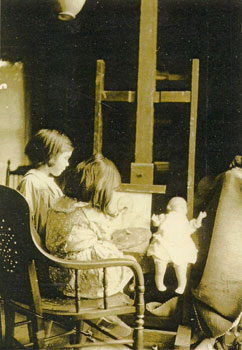 |
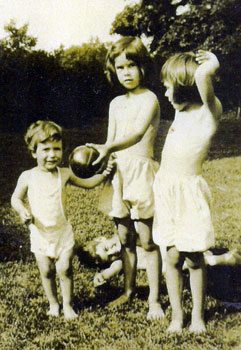 |
| Oona and
Dallas at Teddy's easel. |
Robert,
Oona and Dallas, 1936.
(Unknown boy on ground.) |
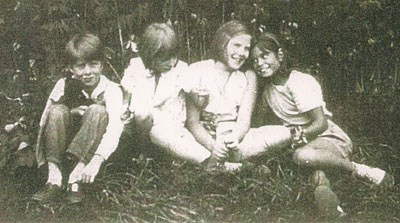 |
|
Cousins Jim, Jeane and Marge
Sheldon with Oona. |
When Gene and Aggie had stayed in The Old House years
earlier, Gene had built a rough tennis court in the back of the house by
the old barn. It was pretty well gone by the time I lived next door, but
Oona and I played many games of Hopscotch on the remains of the hard
ground.
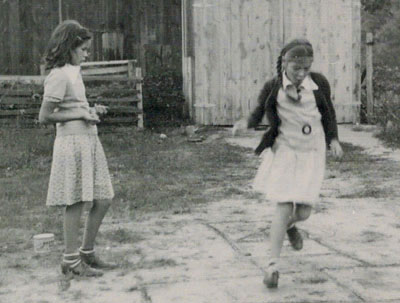 |
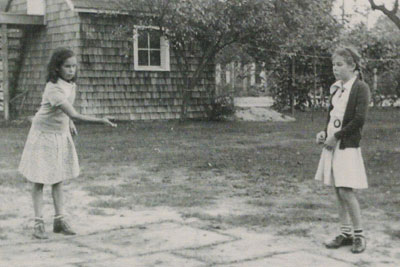 |
| Hopscotch
game, Oona and Dallas, 1936. |
Then there were the special rainy days when we put on
our slickers and walked barefoot to the Manasquan River, where rowboats
anchored along the beach were empty and enticing. We would sit in one
and pretend we were out on the water. One day in the spring, we thought
it was fun to push each other off the boat and fall into the water. At
home we told Nanna we had fallen in, while aside to each other we
giggled... “accidentally on purpose!”
We were nine and eleven when Oona and I decided to start
a poetry club. We would learn “by heart” one poem a week. Nanna was
delighted to be our audience as we recited them to her. One of my
favorites was an Elizabeth Barrett Browning poem, which Oona and I both
learned. There was a line we played to the hilt— “Why you who would not
hurt a mouse can torture so your lover...” Another poem which I
presented, went “Oh what can ail thee knight at arms, alone and palely
loitering...” I exuberantly recited “Oh, what can nail thee, knight at
arms...” We did impress our grandmother.
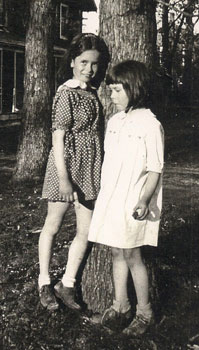 |
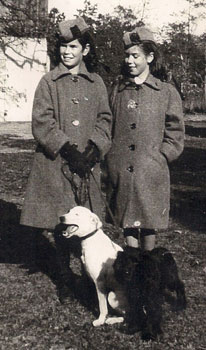 |
| Oona and
Dallas, West Pt. Pleasant. |
Oona,
Dallas and Middie dog with friend, 1936. Matching coats and
hats made by Nanna. |
Nanna sometimes told us stories, and one of our
favorites was about Black Bart. It was a favorite because Nanna said he
was a relative. He was a kind of Robin Hood in the eighteen hundreds and
became a legend, a folk hero, in the history of California. We were told
never to say a word about him to our very prim, elderly Aunt Agnes (Teddy's sister). She was extremely distressed about the family
relationship to a robber! He was Charles Edward Boulton and had come
from a wealthy Philadelphia family. It was on a white-hot day in July 26, 1875, near
Copperopolis, California when Black Bart held his first stagecoach
robbery. He was out-fitted with a flour sack over his head, a dirty
white duster to conceal his build, and rags tied around his feet to
eliminate the possibility of being identified by his footprints.
The story was that he walked out of the sage-brush with
a double-barreled shot gun and stopped a stage coach, demanding that the
driver hand over his gold. He wanted none of the jewelry from the ladies
on board, only the gold from the Wells Fargo Company. He always left a
poem at the scene of the crime.
“I've labored long and hard for bread,
For honor and for riches.
But on my corns too long you've tread,
You fine-haired sons of…!
Then signed, Black Bart,
the Po8
The stories of Black Bart spread worldwide and he
became a folk hero because he never robbed passengers, only the giant,
moneymaking Wells Fargo Company. In almost thirty robberies he never
once pulled the trigger of his shotgun, and some believed it wasn't even
loaded. Eventually he was caught through a laundry mark from a
handkerchief he dropped at the scene of a robbery, and Black Bart spent
a short time in prison. There is no accurately recorded history of his
life after this.
Nanna was a good storyteller, and this was one of our
favorites.
Saturday afternoons were movie times, so Oona and I would walk into town
across the Canal Bridge to meet our two friends, Mavis and Amada
Williams, and go to the show in Point Pleasant. Oona sometimes treated
me, which was fun because then I had a nickel from home to buy candy.
However, when I had enough money to treat Oona, she would refuse.
Looking back, I had strong feelings about that and felt hurt. I wondered
years later if it was her way of telling me she had something I didn’t
have. She had money.
One Saturday on our movie afternoon, when I was ten and
Oona was twelve, we went to see Charlie Chaplin in Modern Times.
Our favorite part was when he rollerskated, kicking himself on the
bottom with his free foot. Actually he was dancing on the skates. After
the show, we walked back home and pulled out our rollerskates. Out on
the road we tried to imitate Charlie, and laughed our way up and down
the street. Little did we dream that one day, only six years later, Oona
would marry him!
Both avid movie fans, and buying movie magazines when we
could, Oona and I kept scrapbooks of our favorite stars. I adored Errol
Flynn who at the time seemed handsome, and I thought Olivia de Havilland
was the most beautiful of all the stars. Oona kept pictures of Nelson
Eddy and Jeanette MacDonald. Oona wrote a fan letter to them and was
overjoyed when they responded. Their letter was her favorite treasure
for quite awhile.
Other memories that we chuckled over later on were the
times when great-aunt Agnes came to visit. As mentioned earlier, she was
grandfather Teddy’s sister and seemed very old. Our mother told Robert
and me that Aunt Agnes was visiting and wanted to see us. Therefore, we
would need to wash our hands very carefully and go over to The Old
House, where she would be staying for a few days with Aggie and the
family. Because she had been made to go through it earlier, Oona was
allowed to stay inside and watch the suffering scene through the window.
Aunt Agnes would be sitting in one of the large wicker
chairs on the porch. Very elderly, with soft white hair pinned up on her
head in a loose top-knot, and pale blue eyes behind silver-rimmed
glasses, Aunt Agnes looked very severe as she greeted us. Then came the
distressing part as we had to go up to her while she inspected our hands
and fingernails to see that they were clean. Poor little Robert had to
bow as he made his exit and I had to curtsy. It was so embarrassing!
Another time which stayed in my mind for years was when
Oona and I were looking at things in the local Woolworth's “Five and
Ten,” and we stood at the cosmetic counter. Oona loved looking at the
nail polish and the lipsticks. She turned to me and whispered, “Why
don’t you take one of the bottles of nail polish? No one will see you.”
All I could think was that she was telling me to steal something. I
never wanted to say “no” to her....I was so afraid she would be angry
with me. I remember wrestling with this for a moment or two. I just
couldn’t do it. Oona was disgusted with me, but I told her I could not
steal something. We walked home in silence. Later on, I wondered why she
had wanted me to do that. Why didn’t she take it herself?
Oona went to visit her father and Carlotta at Tao House
in California only once that I can remember. I felt as though she were
afraid to go, but didn’t want to say so. I also had a feeling she was
nervous about seeing them both. She had liked Carlotta, her step-mother,
who had been kind the first time they met, but she wasn't sure about
this time. Her father seemed awesome and had become such an important
giant to her that it must have been difficult. He was wealthy and famous
and not very available. He seemed quite removed from her life and seldom
wrote to her...mostly little messages through Shane. When she came home
from the visit she did not want to talk about it with me, but retreated
to her small cottage in the back yard, wanting to be alone. On Oona's
last birthday, Aggie had had the little building made into a special
place for her. It was charming, with bookcases, a window seat and a
Dutch door. After a short time alone in the tiny house, Oona seemed to
feel better and quickly slipped back into the routine of school, play,
friends and our fun times together.
Looking back, I can see the disturbing times Oona had,
over and over. There was one early summer evening when we wanted to go
to town across the Canal Bridge. We went in the house to ask Aggie if
Oona could go. Aggie and Jimmy were sitting at the long oval table in
the dining room, with glasses of sherry in front of them. I do not
remember Aggie drinking a great deal, but I was told later on that
sometimes she would binge and then go away for a week or more to
recover. Oona must have been more aware of these times than I was. This
was one of those scenes where I can still see the hurt and pain on
Oona's face as she asked, “May I go to Point to the drugstore for ice
cream?”
Her mother responded in a wobbly voice, “Go do whatever
you want...” and shooed her off with a wave of her hand. Jimmy stared
off into space and didn’t say a word. The drinking was something I was
too young to comprehend, and I wasn’t living with it. Because of Oona’s
reaction, I felt it was serious and seemed frightening.
We left the house. Oona couldn’t talk about her
feelings. We didn’t go into town as we had planned, but went to sit in
her playhouse in the back yard. I tagged along as Oona went inside and
sat in the window seat, where she looked sad and didn’t want to talk. I
went home to write a note to her and put it in our secret tree we called “The
Castle,” a great elm that stood between our houses. The tree had two
trunks with a small hole in between which was good for notes or secret
messages. I thought perhaps a note would make Oona feel better.
 Chapter XV
Chapter XV |